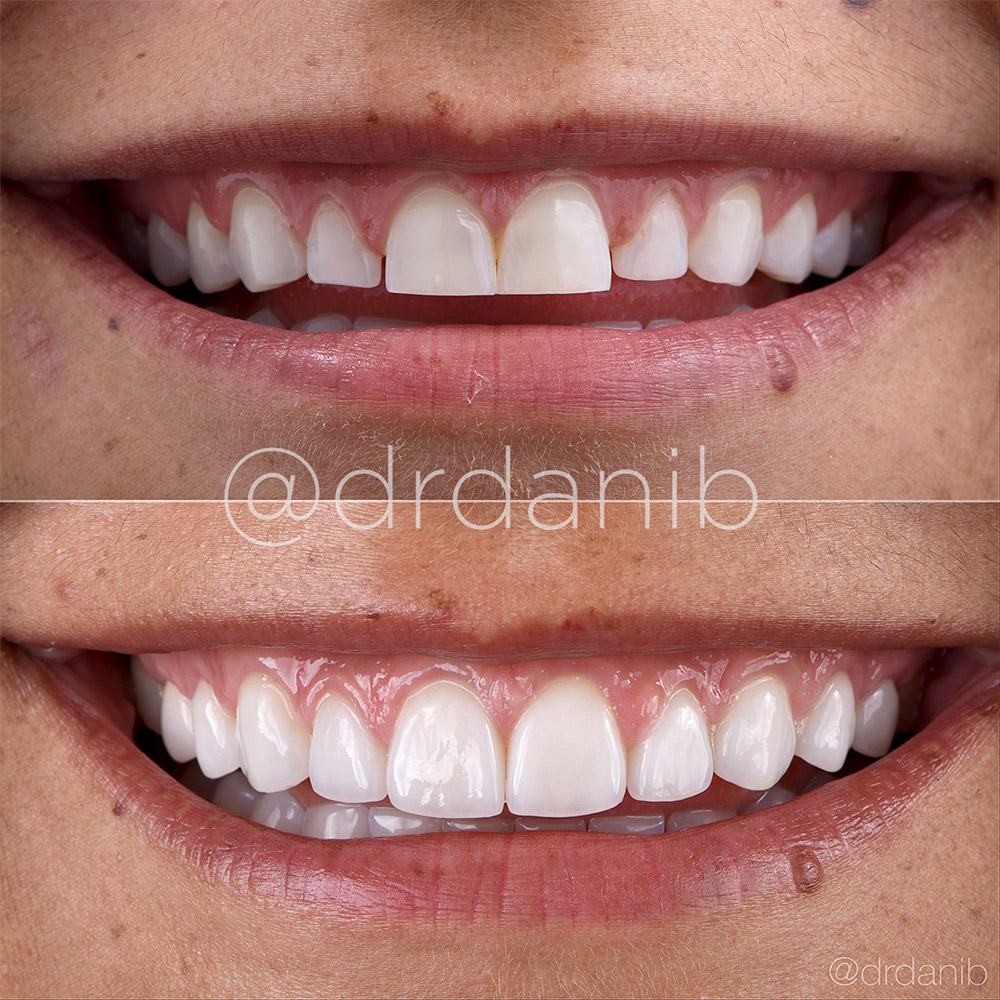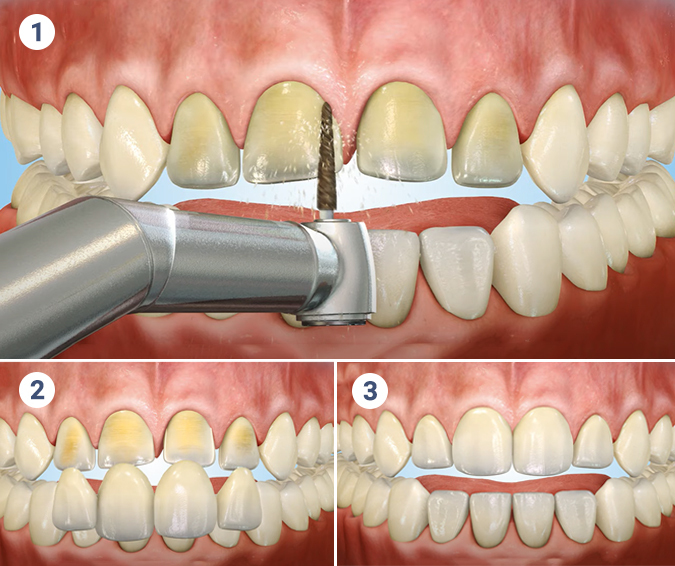Veneers 101: Understanding Their Advantages and How They Change Your Oral Aesthetic Appeal
Veneers are ending up being progressively prominent for those seeking to boost their smiles. These thin shells can properly attend to different oral flaws, from staining to disproportion. Understanding the advantages of veneers is essential for anyone considering this transformative option. The process and choices included can be intricate. What elements should one consider before making a choice? The solutions might amaze you.
What Are Veneers?
Veneers are thin coverings made from porcelain or composite resin that are custom-fitted to the front surface of teeth. Dental Veneers. They are developed to enhance the appearance of the smile by dealing with numerous oral imperfections. Generally, veneers are utilized to deal with issues such as staining, disproportion, and small spaces between teeth. The application procedure requires a dental expert to take specific measurements and produce molds to assure an ideal fit
Prior to positioning veneers, a percentage of enamel might be removed from the tooth surface area to fit the shell, permitting an all-natural feel and look. As soon as put, veneers can considerably boost the looks of a person's smile, providing a bright and uniform appearance. Individuals commonly choose veneers for their durability and resistance to spots, making them a popular option for those looking for a long-lasting cosmetic option. On the whole, veneers supply a transformative approach to attaining a much more enticing smile.
The Benefits of Deciding On Veneers
While lots of cosmetic oral choices exist, choosing veneers supplies a special blend of visual and practical advantages. Veneers improve the appearance of teeth, supplying an all-natural look that can significantly boost a person's smile. They are specifically effective in dealing with issues such as staining, chips, and voids, making them a versatile option for numerous dental problems.
In enhancement to their visual allure, veneers are likewise sturdy and stain-resistant, making them a resilient investment in oral aesthetics. With correct care, they can maintain their appearance for many years. The application of veneers requires very little modification to the natural tooth framework contrasted to various other alternatives, protecting the stability of the teeth.

The Veneer Application Refine
The veneer application process starts with a detailed consultation, throughout which the dental expert evaluates the individual's dental health and wellness and goes over aesthetic objectives. This preliminary conference allows the dental expert to analyze issues such as discoloration, chips, or gaps, and figure out if veneers are an appropriate solution. Once the patient is considered a good prospect, the following action involves preparing the teeth. This may include eliminating a tiny quantity of enamel to ensure a correct suitable for the veneers.
Impacts of the teeth are after that taken, which are sent to an oral laboratory where the customized veneers are developed. During this moment, a short-lived solution might be supplied. After a few weeks, the client returns to have the long-term veneers fitted. The dental practitioner checks the fit and color, making modifications as required. Ultimately, the veneers are bonded to the teeth using a strong adhesive, finishing the transformation and improving the patient's smile.
Kinds of Veneers: Porcelain vs. Composite
When taking into consideration aesthetic oral options, people commonly consider the benefits of porcelain and composite veneers. Porcelain veneers are preferred for their sturdiness and resistance to discoloration, making them an excellent long-lasting option for improving smiles. These slim coverings are customized to match the natural teeth, providing a realistic look that many like. Furthermore, porcelain reflects light likewise to natural enamel, adding to an extra authentic look.
On the other hand, composite veneers are generally less costly and can be used in a single check out. Made from a tooth-colored material, they supply flexibility in shaping and can be easily repaired if damaged. They may not last as long as porcelain and are much more prone to staining over time. Ultimately, the selection between porcelain and composite veneers depends upon private aesthetic goals, spending plan considerations, and the details oral scenario, directing people towards the most effective choice for their demands.
Preserving Your Veneers for Durability
Proper maintenance is vital for guaranteeing the durability of veneers. Routine dental examinations play a significant role, allowing professionals to examine the problem of the veneers and surrounding teeth. Great dental health methods, such as brushing two times daily with a non-abrasive toothpaste and flossing, help protect against plaque build-up and preserve the total health of the mouth.
In addition, people ought to stay clear of utilizing their teeth as devices, which can endanger the integrity of veneers. Limiting the consumption of sticky or tough foods decreases the risk of damage. It is also suggested to avoid practices like nail-biting or grinding teeth, as these discover here can bring about premature wear.
Using a soft-bristled toothbrush and mild mouthwash can even more enhance veneer treatment. By complying with these basic yet effective upkeep tips, people can enjoy their veneers' aesthetic advantages for years ahead, ensuring an attractive smile that stands the test of time.

Prospective Dangers and Considerations
Many prospective dangers and considerations go along with the decision to obtain veneers. To start with, the procedure generally requires the elimination of a slim layer of enamel from the natural teeth, which can bring about raised level of sensitivity and potential damages otherwise performed properly. In addition, veneers are not reversible; when applied, my site the all-natural tooth framework is completely changed.
There is likewise a threat of veneers breaking or cracking, specifically if the individual involves in habits like teeth grinding or attacking difficult objects. In addition, if the underlying tooth creates degeneration after veneer positioning, it may complicate therapy options.
Cost is one more factor to consider, as veneers can be expensive and commonly not covered by insurance coverage. Individuals ought to be mindful of the need for recurring upkeep and potential substitutes every 5 to 10 years, making it vital to weigh these factors against the aesthetic benefits veneers supply.

Regularly Asked Concerns
How Much Time Do Veneers Typically Last Before Requiring Replacement?
Veneers normally last in between 10 to 15 years, depending upon variables such as dental health, way of life practices, and the quality of materials utilized. Routine dental exams can help guarantee their durability and excellent problem.
Can Veneers Be Eliminated As Soon As Applied?
Yes, veneers can be gotten rid of as soon as applied (Dental Veneers). This procedure commonly calls for specialist help, as it entails mindful techniques to stay clear of damaging the underlying tooth structure, which may be influenced by the veneer placement.
Are Veneers Suitable for Everyone?
Veneers are not ideal for every person. Individuals with considerable oral concerns, such as serious decay or periodontal condition, might call for alternate therapies. A thorough dental assessment is important to establish candidacy for veneer application.
Do Veneers Require Unique Dental Products for Cleansing?
Veneers do not require unique oral products for cleaning; however, using non-abrasive toothpaste and a soft-bristled tooth brush is suggested. What Are Veneers. Routine dental exams and great oral health methods keep their look and longevity properly
What Is the Cost Variety for Getting Veneers?
The cost for obtaining veneers typically ranges from $500 to $2,500 per tooth, relying on variables such as material type, dental professional competence, and local pricing variations. Individuals ought to seek consultations for precise price quotes customized to their requirements.
Veneers are thin shells made from porcelain or composite resin that are custom-fitted to the front surface of teeth. Before putting veneers, a little quantity of enamel might be gotten rid of from the tooth surface website link to accommodate the covering, allowing for a natural appearance and really feel. Veneers enhance the appearance of teeth, offering an all-natural look that can considerably boost a person's smile. Impressions of the teeth are after that taken, which are sent to an oral laboratory where the personalized veneers are produced. Routine oral check-ups play a considerable duty, allowing specialists to assess the problem of the veneers and bordering teeth.